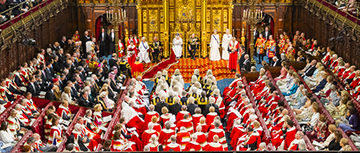If one had asked the median informed liberal voter 3–4 months ago the greatest overall threat facing our way of life, I speculate that the answer you would have got would have been ‘climate change’ in the main, with perhaps a slightly nutty rump claiming ‘Brexit’. I very much doubt you would get the same answer now. However, for all the current excitement around the coronavirus, the climate remains our largest and most difficult threat. I do however place an important caveat: part of the reason why I consider it such a large threat is that the policy solutions that amount to ‘brute forcing’ the problem, by instantly decarbonising, are generally considered either infeasible, politically untenable, or both. Bearing all this in mind, please indulge me in a flight of fantasy, and little historical fiction…
Imagine that in the summer of 2018, the summer heatwave is slight worse by an extra couple of degrees. Going outside for any length of time becomes uncomfortable, food supply chains start to become disrupted as farm labourers are unable to work in the heat, and perhaps seeing the elderly faint in the street becomes somewhat common. Suddenly, there is a shift in public opinion: forget Brexit, forget the deficit, the climate is our #1 political priority.¹ Both the May government, and the Corbyn opposition, are lambasted in the media for their relative lack of emphasis on the issue, and the internal contradictions within their parties regarding climate are laid bare. In a chaotic snap election, a populist environmentalist coalition arrives in Downing Street, with several MPs from the new Extinction Party given cabinet briefs. Given the unprecedented risk to human life posed by climate change, they say, there is only one solution: instant, 100% decarbonisation. From the get-go, carbon intensive energy generation and industry is told to shut down. Non-essential journeys within the country are banned, and flights cut to a bare minimum. Businesses across the country are told to furlough staff until sufficient wind turbines are constructed to meet our electricity needs, and reliable electricity storage systems are developed, with an almost unlimited amount of spending promised. Given the global nature of the crisis, international pressure is placed on other countries to take similar measures, even though many are manifestly incapable of sustaining their economies to even the limited extent of Britain.
Ministers regularly appear on the news to tell us that although we are likely suffering as a result of these measures, the consequences of climate catastrophe mean it is necessary, and they have the scientific consensus behind them. Queries about when this shutdown is going to end are met with accusations that the questioner isn’t taking the climate crisis seriously, and that it would be wrong for the government to go off-message: “Stay at home, fix our National Grid, save lives.”
In a fantasy world such as this, I think it is both plausible and likely that even fairly dogged climate activists would have to give pause for thought. Although there has long been a wait for the climate event that will wake people up to the ongoing crisis, when faced with one, I suspect we would balk at crippling our industry and our economy overnight, and the political implications of making people destitute. And yet, in the face of an event that, although more immediate, is by most measures less serious than climate change in terms of number of forecasted excess deaths,² we have had no significant public opposition to doing so. This pandemic has undoubtedly coloured every aspect of our political life for the foreseeable future, and as such, I can’t help but fear that our climate discourse may have been irrevocably poisoned by it. Either we will now have such an enthusiasm for lockdowns that only extreme responses are deemed sufficient,³ or we will still be feeling the effects of the incoming recession to such an extent, and hyper fixated on corona for so long, that capturing public attention and willingness to make sacrifices on anything else becomes impossible. Corona has proven that measures previously deemed implausible are in fact achievable if one is able to get the public on side, but that says nothing as to whether doing so would be advisable.
¹ The Autumn 2019 floods would also be a plausible candidate for an event that might shift public opinion in this way.
² Obviously, there is no uncontroversial way to calculate this for either coronavirus or climate change.
³ As an aside, I am inclined to believe that a cap-and-trade scheme for leaving the house would actually work quite well, with non-essential workers able to ‘sell’ their labour time to others, and as such spreading the burden of lost wages.



0 Comments